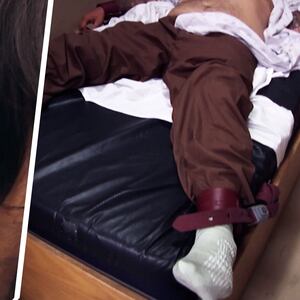The documentary Pray Away, which was supposed to premiere at the Tribeca Film Festival this year, deftly explains the continued and renewed existence of the “ex-gay” movement: In a world filled with multiple forms of systemic abuse and intolerance toward gay and transgender people—which reached a dramatic inflection point with the AIDS crisis of the ‘80s and ‘90s—the fearful and profiteering groups that claim you can “pray away” or behaviorally stamp out same-sex attraction or trans identity will always have an avenue in.
Director Kristine Stolakis focuses her camera on “ex-ex-gays,” particularly former and regretful leaders of the Exodus International conversion therapy-focused ministry, as well as other religious groups who led themselves to believe that their trauma was due to their “gay lifestyles” and not related to systemic oppression or perhaps witnessing the governmental neglect and slow death of their community during the AIDS crisis. (Queer theorist and philosopher Lauren Berlant defines slow death as “the physical wearing out of a population and the deterioration of people in that population that is very nearly a defining condition of their experience and historical existence.”) From John Paulk to Yvette Cantu Schneider, these leaders not only convinced struggling young gay Christians that there was something wrong with them that could only be fixed by extinguishing their gay feelings, but also teamed up with conservative government to lobby against the liberal movement for gay rights, especially gay marriage.
The documentary also follows Jeffrey McCall, the current leader of Freedom March, an activist culture-appropriating ex-gay movement that spurns traditional conversion therapy but operates on the idea that trans and queer identities are propagandistic and harmful, and that you can reject them for a life committed to Jesus. Members of this movement include a survivor of the Orlando Pulse nightclub shooting, Luis Javier Ruiz, who says Freedom March has saved him from a lifestyle of sexual promiscuity, drug abuse, and drinking. McCall used to identify as a trans woman and was also a sex worker, and the documentary allows him his full testimony and perspective—which is fervently ex-gay and ex-trans to this day—but also depicts his silent anguish, as he breaks down in tears or drops the smile from his face at sudden and unexpected points.
An important perspective that the documentary doesn’t make time for is that of queer, gay, and trans people who fit neither into the struggling Christian or constitutional rights-focused liberal groups: Flagrant, non-conforming dykes, fags, and trans people who are no more interested in fighting for gay marriage than they are in praying the gay away. In fact, many of these people were the backbone of ACT UP, the radical activist organization that fought tirelessly for lifesaving HIV/AIDS treatment (though it’s important to point out that some of these activists later became much more moderate and even relatively conservative later on, perhaps leaving their radical pasts behind in the face of the unresolved trauma of watching so many of their friends die). And the current core of the radical queer community is filled with black, low-income, poor, homeless, and incarcerated or formerly incarcerated individuals who do not hate themselves and fight alongside and for each other not simply for pride, per se, but for the material resources and transformative changes that will keep them and their communities (even beyond the explicitly LGBTQIA) thriving rather than dying.
Somewhat ironically, McCall and his Freedom March group provide the film’s only glimpse into those who fall outside of the white middle class, and whose ex-gay fervor seems to be more directly attached to the present refusal of conservative Christian churches to address the trauma brought on by structural neglect. It seems clear that McCall’s pain stems from his particular circumstances while living first as a gay man and sex worker and then as a trans woman, though not necessarily because of the identities themselves. But instead of offering McCall both acceptance and care, the church seems to have offered McCall a transaction: Reject your identity and you will be welcomed with open arms; you’ll be a leader with a purpose.
So it’s not only conversion therapy that’s worth fighting, but the idea that trauma is an individual problem and not one wrought by the systems we live under, including transphobia, homophobia, and capitalism. In that way, Pray Away misses out on a major opportunity for insight by excluding more radical voices that have something to say about what sex workers, promiscuous people, and drug users would need to feel safe and loved that doesn’t require their internalizing stigma and rejection (even if what may be required is going sober, using less often, or practicing safer sex, for example). The documentary, instead, comes off a bit like a paean to white normativity, but with tolerant gay enlightenment.
This focus, in the end, speaks to the mainstream liberal gay perspective, which while fighting for important rights and recognition that can and do save lives, often functionally ignores or defers the needs of members of the community who do not want to conform, but want to live all the same. I say this because the radical community offers something not alternative or peripheral but essential and fundamental to the fight for LGBTQIA life: that heteropatriarchal capitalist conformity is death, and that it is not equality with that system, but liberation from it, that is the project worth taking on together.


